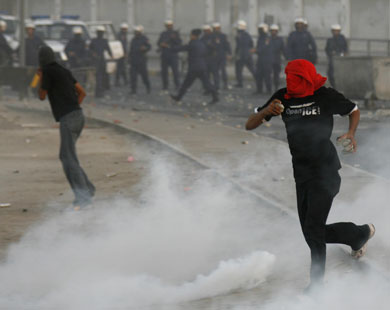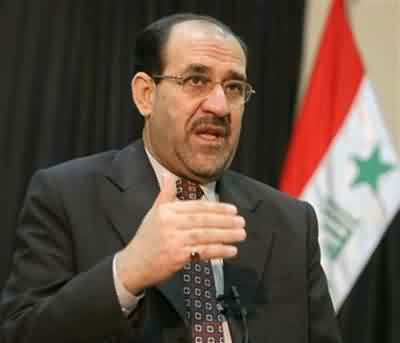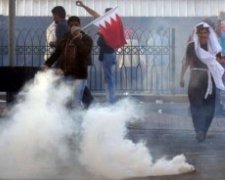Bahraini security forces fired Friday teargas to break up an anti-government protest rally near the capital of Manama.
 Bahraini security forces fired Friday teargas to break up an anti-government protest rally near the capital of Manama.
Bahraini security forces fired Friday teargas to break up an anti-government protest rally near the capital of Manama.
Al-Wefaq opposition group said on Friday that Issa Abdullah, 71, died from asphyxiation inside his home in Maameer village after teargas fumes leaked into his house. His death brought the number of those killed since the start of the protests to at least 24.
Despite heavy security presence and a ban on demonstrations, thousands of anti-government protesters poured into the streets across Bahrain following the Friday Prayers, demanding an end to almost 200 years of the Sunni-led monarchy.
Bahraini security dispersed the crowds using teargas, buckshots and stun grenades. Many protesters were reported to be injured.
A prominent Shia cleric said their campaign for political reforms would not be silenced by "brutal force'' and that they would continue their peaceful protest rallies until their demands are met.
"The brutal force and abusive language being deployed against us will never destroy our will and desire to achieve our rights and dignity,'' Sheikh Issa Qassim said in a sermon in Duraz -- an opposition stronghold northwest of Manama.
Meanwhile, Bahrain authorities dismissed suggestions for an international investigation into the deaths of protesters or the police attack on wounded protesters at the country's main hospital.
Bahrain's acting health minister, Fatima al-Balooshi, said in Geneva that Bahrain is conducting its own investigation into the violence and denied reports that some protesters who were injured in the government crackdown were questioned and beaten by police while recovering in Salmaniya Hospital.
News Agencies covering the Bahraini cause since its start had reported violence against protesters and the hospital.
IRAQ’S MALIKI
 Iraqi Prime Minister Nouri al-Maliki has warned that the deployment of Saudi and other Gulf troops to protest-hit Bahrain could spark a sectarian war.
Iraqi Prime Minister Nouri al-Maliki has warned that the deployment of Saudi and other Gulf troops to protest-hit Bahrain could spark a sectarian war.
Maliki's warning came after Saudi Arabia and the UAE sent hundreds of troops to the tiny Persian Gulf state to help the Kingdom's brutal crackdown on Bahrain's anti-government protesters.
"The situation in Bahrain is different from those in Libya and Egypt. In Libya and Egypt the issue is not sectarian while in Bahrain it has become between Sunnis and Shias," Maliki said in an interview with BBC Arabic on Friday.
His comments come in the wake of Bahrain's heavy-handed crackdown on anti-government protesters that have been seeking political reforms and an end to the two-century long rule of al-Khalifa dynasty.
"We did not move to support the Shias in Bahrain but we called for interference in Bahraini affairs to be stopped and don't want to make it a sectarian issue. Because if it happens, it will be like a snowball, it will get bigger if it is ignored ... The region may be drawn into a sectarian war," the Iraqi premier noted.
At least 24 people have been killed and thousands more wounded since the start of the recent uprising in Bahrain, with the most recent victim dying on Friday by teargas fired by Bahraini security forces.
